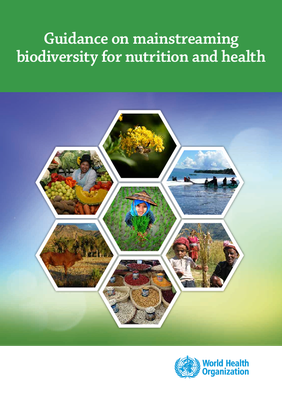Guidance on mainstreaming biodiversity for nutrition and health
While human ingenuity and innovation have made considerable strides in meeting growing demands for food, shelter and energy over the past century, this progress has carried very high social and environmental costs (1). At present, more than one third of the world’s land surface and nearly 75% of freshwater resources are devoted to crop or livestock production (2). These impacts could rise 50–90% by 2050 without a significant transformation of global food systems (2–4). At the same time, the global food system – which fails to provide all people with healthy, safe, affordable and sustainable diets – is a central factor in current trends of malnutrition in all its forms (1,5–7). Poor diets have now become the single-most important driver of mortality globally accounting for nearly 11 million premature adult deaths per year (7).
https://biodiversitylinks.org/learning-evidence/one-health-evidence/one-health-evidence-inbox/guidance-on-mainstreaming-biodiversity-for-nutrition-and-health.pdf/view
https://biodiversitylinks.org/learning-evidence/one-health-evidence/one-health-evidence-inbox/guidance-on-mainstreaming-biodiversity-for-nutrition-and-health.pdf/@@download/image/image.png
File
Guidance on mainstreaming biodiversity for nutrition and health
Author(s):
World Health Organization (WHO)
Publication Date: 2020
DOWNLOAD FILE
While human ingenuity and innovation have made considerable strides in meeting growing demands for food, shelter and energy over the past century, this progress has carried very high social and environmental costs (1). At present, more than one third of the world’s land surface and nearly 75% of freshwater resources are devoted to crop or livestock production (2). These impacts could rise 50–90% by 2050 without a significant transformation of global food systems (2–4). At the same time, the global food system – which fails to provide all people with healthy, safe, affordable and sustainable diets – is a central factor in current trends of malnutrition in all its forms (1,5–7). Poor diets have now become the single-most important driver of mortality globally accounting for nearly 11 million premature adult deaths per year (7).



